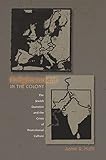Enlightenment in the colony the Jewish question and the crisis of postcolonial culture
Material type: TextPublication details: Princeton Princeton University Press 2007Description: xiii,325p. 24 cmISBN:
TextPublication details: Princeton Princeton University Press 2007Description: xiii,325p. 24 cmISBN: - 9780691057323
- 211.60954 22 MU-E
- DS428.2 .M82 2007
 Print
List(s) this item appears in:
O P Jindal Global Library Recent Acquisitions May(Last 2 Weeks) 2016 List
Print
List(s) this item appears in:
O P Jindal Global Library Recent Acquisitions May(Last 2 Weeks) 2016 List
| Item type | Home library | Collection | Shelving location | Call number | Materials specified | Status | Date due | Barcode | |
|---|---|---|---|---|---|---|---|---|---|
 Print
Print
|
OPJGU Sonepat- Campus | General Books | Main Library | 211.60954 MU-E (Browse shelf(Opens below)) | Available | 133161 |
Includes bibliographical references (p. [295]-313) and index.
Prologue : towards a genealogy of postcolonial secularism -- Jewishness as minority : emergence of a European problematic -- Inscriptions of minority in British late imperial culture : from Daniel Deronda to A passage to India -- Jawaharlal Nehru and Abul Kalam Azad : discovering India -- Saadat Hasan Manto : a greater story writer than God -- Faiz Ahmed Faiz : towards a lyric history of India -- Epilogue : in my beginning is my end : Jewish exile and the language of English India.
Enlightenment in the Colony opens up the history of the "Jewish question" for the first time to a broader discussion--one of the social exclusion of religious and cultural minorities in modern times, and in particular the crisis of Muslim identity in modern India. Aamir Mufti identifies the Hindu-Muslim conflict in India as a colonial variation of what he calls "the exemplary crisis of minority"--Jewishness in Europe. He shows how the emergence of this conflict in the late nineteenth century represented an early instance of the reinscription of the "Jewish question" in a non-Western society undergoing modernization under colonial rule. In so doing, he charts one particular route by which this European phenomenon linked to nation-states takes on a global significance. Mufti examines the literary dimensions of this crisis of identity through close readings of canonical texts of modern Western--mostly British-literature, as well as major works of modern Indian literature in Urdu and English. He argues that the one characteristic shared by all emerging national cultures since the nineteenth century is the minoritization of some social and cultural fragment of the population, and that national belonging and minority separatism go hand in hand with modernization.
There are no comments on this title.

